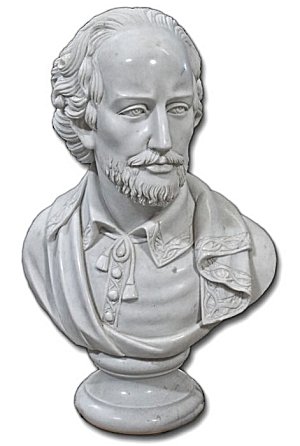Fleurs du Mal Magazine


Or see the index

William Shakespeare
Sonnet 130
My mistress’ eyes are nothing like the sun,
Coral is far more red, than her lips red,
If snow be white, why then her breasts are dun:
If hairs be wires, black wires grow on her head:
I have seen roses damasked, red and white,
But no such roses see I in her cheeks,
And in some perfumes is there more delight,
Than in the breath that from my mistress reeks.
I love to hear her speak, yet well I know,
That music hath a far more pleasing sound:
I grant I never saw a goddess go,
My mistress when she walks treads on the ground.
And yet by heaven I think my love as rare,
As any she belied with false compare.
William Shakespeare
Sonnet 130
Geen zonlicht gloeit in ‘t oog van wie ik hou,
Nooit wordt haar liprood met koraal verward,
Is sneeuw soms wit, dan zijn haar borsten grauw,
Is hoofdhaar draad, dan zijn haar draden zwart;
Gevlamde rozen ken ik, rood en wit,
Maar haar wang toont geen roos die zo ontluikt,
Er zijn parfums waar zoeter geur in zit
Dan waar de adem van mijn lief naar ruikt.
Al houd ik van haar stem, ik zie goed in,
Muziekklank zweeft veel aangenamer rond;
‘t Is waar, gaan zag ik nooit nog een godin,
Als mijn lief wandelt treedt ze op de grond.
En toch, bij God, ik acht mijn lief zo hoog,
Als elke vrouw bedot met vals vertoog.
(nieuwe vertaling Cornelis W. Schoneveld, mei 2012)
kempis.nl poetry magazine
More in: -Shakespeare Sonnets, Shakespeare

William Shakespeare
(1564-1616)
THE SONNETS
130
My mistress’ eyes are nothing like the sun,
Coral is far more red, than her lips red,
If snow be white, why then her breasts are dun:
If hairs be wires, black wires grow on her head:
I have seen roses damasked, red and white,
But no such roses see I in her cheeks,
And in some perfumes is there more delight,
Than in the breath that from my mistress reeks.
I love to hear her speak, yet well I know,
That music hath a far more pleasing sound:
I grant I never saw a goddess go,
My mistress when she walks treads on the ground.
And yet by heaven I think my love as rare,
As any she belied with false compare.
![]()
kempis.nl poetry magazine
More in: -Shakespeare Sonnets

William Shakespeare
Sonnet 129
The expense of spirit in a waste of shame
Is lust in action; and till action, lust
Is perjured, murderous, bloody, full of blame,
Savage, extreme, rude, cruel, not to trust;
Enjoyed no sooner, but despisèd straight;
Past reason hunted; and no sooner had,
Past reason hated, as a swallowed bait,
On purpose laid to make the taker mad;
Mad in pursuit, and in possession so;
Had, having, and in quest to have, extreme;
A bliss in proof and proved, a very woe;
Before, a joy proposed; behind, a dream.
All this the world well knows; yet none knows well
To shun the heaven that leads men to this hell.
Sonnet 129
Verzieking der ziel in schandelijk verval,
Dat is de daad der lust; lust tot de daad
Is meineed, bloeddorst, moord, bitterste gal,
Extreem, verwilderd, ruw, wreed, vol verraad;
Amper gesmaakt, of prompt al weer veracht;
Zinloos begeerd, de buik nog amper vol,
Of zinloos weer gehaat, want aangebracht
Als lokaas, maakt het hem die toehapt dol;
Dol in de jacht, en in verovering;
Hebbend, gehad, en hebberig: zonder toom;
Zalig de daad; gedaan, een zielig ding;
Ervoor, verwacht genot; erna, een droom.
Wel weet de wereld dit, maar weet niet wel
D’ hemel te mijden leidend naar die hel.
Vertaald door Cornelis W. Schoneveld, Bestorm mijn hart, (2008, pp. 53-55); herziening feb. 2012
kempis.nl poetry magazine
More in: -Shakespeare Sonnets, Shakespeare

William Shakespeare
(1564-1616)
THE SONNETS
128
How oft when thou, my music, music play’st,
Upon that blessed wood whose motion sounds
With thy sweet fingers when thou gently sway’st
The wiry concord that mine ear confounds,
Do I envy those jacks that nimble leap,
To kiss the tender inward of thy hand,
Whilst my poor lips which should that harvest reap,
At the wood’s boldness by thee blushing stand.
To be so tickled they would change their state
And situation with those dancing chips,
O’er whom thy fingers walk with gentle gait,
Making dead wood more blest than living lips,
Since saucy jacks so happy are in this,
Give them thy fingers, me thy lips to kiss.
![]()
kempis.nl poetry magazine
More in: -Shakespeare Sonnets

William Shakespeare
(1564-1616)
THE SONNETS
127
In the old age black was not counted fair,
Or if it were it bore not beauty’s name:
But now is black beauty’s successive heir,
And beauty slandered with a bastard shame,
For since each hand hath put on nature’s power,
Fairing the foul with art’s false borrowed face,
Sweet beauty hath no name no holy bower,
But is profaned, if not lives in disgrace.
Therefore my mistress’ eyes are raven black,
Her eyes so suited, and they mourners seem,
At such who not born fair no beauty lack,
Slandering creation with a false esteem,
Yet so they mourn becoming of their woe,
That every tongue says beauty should look so.
![]()
kempis.nl poetry magazine
More in: -Shakespeare Sonnets

William Shakespeare
(1564-1616)
THE SONNETS
126
O thou my lovely boy who in thy power,
Dost hold Time’s fickle glass his fickle hour:
Who hast by waning grown, and therein show’st,
Thy lovers withering, as thy sweet self grow’st.
If Nature (sovereign mistress over wrack)
As thou goest onwards still will pluck thee back,
She keeps thee to this purpose, that her skill
May time disgrace, and wretched minutes kill.
Yet fear her O thou minion of her pleasure,
She may detain, but not still keep her treasure!
Her audit (though delayed) answered must be,
And her quietus is to render thee.
![]()
kempis.nl poetry magazine
More in: -Shakespeare Sonnets

William Shakespeare
(1564-1616)
THE SONNETS
125
Were’t aught to me I bore the canopy,
With my extern the outward honouring,
Or laid great bases for eternity,
Which proves more short than waste or ruining?
Have I not seen dwellers on form and favour
Lose all, and more by paying too much rent
For compound sweet; forgoing simple savour,
Pitiful thrivers in their gazing spent?
No, let me be obsequious in thy heart,
And take thou my oblation, poor but free,
Which is not mixed with seconds, knows no art,
But mutual render, only me for thee.
Hence, thou suborned informer, a true soul
When most impeached, stands least in thy control.
![]()
kempis.nl poetry magazine
More in: -Shakespeare Sonnets

William Shakespeare
(1564-1616)
THE SONNETS
124
If my dear love were but the child of state,
It might for Fortune’s bastard be unfathered,
As subject to time’s love or to time’s hate,
Weeds among weeds, or flowers with flowers gathered.
No it was builded far from accident,
It suffers not in smiling pomp, nor falls
Under the blow of thralled discontent,
Whereto th’ inviting time our fashion calls:
It fears not policy that heretic,
Which works on leases of short-numbered hours,
But all alone stands hugely politic,
That it nor grows with heat, nor drowns with showers.
To this I witness call the fools of time,
Which die for goodness, who have lived for crime.
![]()
kempis.nl poetry magazine
More in: -Shakespeare Sonnets

William Shakespeare
(1564-1616)
THE SONNETS
123
No! Time, thou shalt not boast that I do change,
Thy pyramids built up with newer might
To me are nothing novel, nothing strange,
They are but dressings Of a former sight:
Our dates are brief, and therefore we admire,
What thou dost foist upon us that is old,
And rather make them born to our desire,
Than think that we before have heard them told:
Thy registers and thee I both defy,
Not wond’ring at the present, nor the past,
For thy records, and what we see doth lie,
Made more or less by thy continual haste:
This I do vow and this shall ever be,
I will be true despite thy scythe and thee.
![]()
kempis.nl poetry magazine
More in: -Shakespeare Sonnets

William Shakespeare
(1564-1616)
THE SONNETS
122
Thy gift, thy tables, are within my brain
Full charactered with lasting memory,
Which shall above that idle rank remain
Beyond all date even to eternity.
Or at the least, so long as brain and heart
Have faculty by nature to subsist,
Till each to razed oblivion yield his part
Of thee, thy record never can be missed:
That poor retention could not so much hold,
Nor need I tallies thy dear love to score,
Therefore to give them from me was I bold,
To trust those tables that receive thee more:
To keep an adjunct to remember thee
Were to import forgetfulness in me.
![]()
kempis.nl poetry magazine
More in: -Shakespeare Sonnets

William Shakespeare
(1564-1616)
THE SONNETS
121
‘Tis better to be vile than vile esteemed,
When not to be, receives reproach of being,
And the just pleasure lost, which is so deemed,
Not by our feeling, but by others’ seeing.
For why should others’ false adulterate eyes
Give salutation to my sportive blood?
Or on my frailties why are frailer spies,
Which in their wills count bad what I think good?
No, I am that I am, and they that level
At my abuses, reckon up their own,
I may be straight though they themselves be bevel;
By their rank thoughts, my deeds must not be shown
Unless this general evil they maintain,
All men are bad and in their badness reign.
![]()
kempis.nl poetry magazine
More in: -Shakespeare Sonnets

William Shakespeare
(1564-1616)
THE SONNETS
120
That you were once unkind befriends me now,
And for that sorrow, which I then did feel,
Needs must I under my transgression bow,
Unless my nerves were brass or hammered steel.
For if you were by my unkindness shaken
As I by yours, y’have passed a hell of time,
And I a tyrant have no leisure taken
To weigh how once I suffered in your crime.
O that our night of woe might have remembered
My deepest sense, how hard true sorrow hits,
And soon to you, as you to me then tendered
The humble salve, which wounded bosoms fits!
But that your trespass now becomes a fee,
Mine ransoms yours, and yours must ransom me.
![]()
kempis.nl poetry magazine
More in: -Shakespeare Sonnets
Thank you for reading Fleurs du Mal - magazine for art & literature